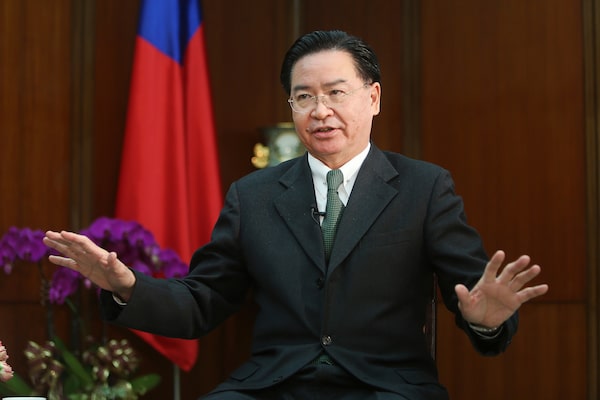
Taiwanese Foreign Minister Joseph Wu gestures while speaking during an exclusive interview with The Associated Press at his ministry in Taipei, Taiwan, on Dec. 10, 2019. Taiwan is a self-governing democratic territory, with its own currency and military, that is claimed by China as a renegade province.Chiang Ying-ying/The Associated Press
Bending to demands from Beijing is unwise, Taiwan’s Foreign Minister is warning, days before an extradition hearing begins in Canada for Huawei executive Meng Wanzhou, whose release China has loudly demanded.
The arrest of Ms. Meng in December, 2018, set in motion an escalating diplomatic and economic dispute with China, which has blocked imports of some Canadian goods and arrested two men, Michael Kovrig and Michael Spavor, accusing them of state-secrets violations in what has been widely seen as retaliation. Calls for Ottawa to release Ms. Meng have intensified as the continuing conflict exacts an increasing toll.
But seeking to mollify China is risky, Taiwanese Foreign Minister Joseph Wu warned in an interview this week.
“Taiwan’s experience is that if we cave in to China’s demands, China would always demand more,” Mr. Wu said, just days before Saturday’s presidential vote, in which his Democratic Progressive Party is seeking re-election. Rather than “appease China,” he said, “the best way to deal with it is for the like-minded countries to work together in dealing with the situation. Hostage-taking cannot be accepted by modern civilization.”
Taiwan occupies a unique position relative to Beijing. It is a self-governing democratic territory, with its own currency and military, that is claimed by China as a renegade province.
That has placed Taipei at what Mr. Wu calls the “front line of China’s authoritarian expansionism.” Taiwan nationals have also been seized by Chinese authorities “without any clear evidence of wrongdoing,” he said. The human-rights group Safeguard Defenders has compiled a list of people caught up in what it calls Chinese “hostage diplomacy” in recent years. They come from Canada, Taiwan, the U.S., Japan, Australia, Britain and Hong Kong.
In Canada, Justice Minister David Lametti can step in at any time to halt extradition proceedings against Ms. Meng, who U.S. prosecutors accuse of fraud related to violations of sanctions against Iran. The extradition hearing for Ms. Meng is scheduled to begin Jan. 20, but Huawei and the Chinese government have called the allegations against her politically motivated. Senior members of the Canadian corporate and political establishment, including former prime minister Jean Chrétien, have advocated for Ottawa to release Ms. Meng in hopes of normalizing relations with China.
But to do so “would encourage [China] to use hostage diplomacy more in the future, because it shows that it works,” said Scott Simon, the co-chair in Taiwan Studies at the University of Ottawa. He also warned that it’s unlikely any such move, even if it won the release of the imprisoned Canadians, would return relations with Beijing to normal. “We can’t go back,” he said, pointing to a Chinese leadership he called recalcitrant and confident.
He suggested taking seriously the words of caution from Mr. Wu. Taiwan’s proximity to China means it has “a lot of lessons for us,” he said.
Chinese scholars, however, assailed the Taiwanese politician as self-interested and untrustworthy.
The Democratic Progressive Party “will say whatever it can to hurt China’s image on the international stage,” said Zhang Wensheng, deputy director of the Graduate Institute for Taiwan Studies at Xiamen University. “Joseph Wu, by raising Taiwan’s high-level experience in coping with China and issuing warnings to other countries, is making a mistake. It’s as ridiculous as Quebec teaching the rest of the world about its expertise in dealing with Canada.”
The notion that “Canada would be seen as weak by listening to China’s words and releasing Ms. Meng is groundless,” he added. “Maintaining good diplomatic relations means you must negotiate, exchange interests and make necessary sacrifices. Mr. Wu made such a warning just to provoke alienation between China and Canada.”
Li Zhenguang, deputy director of the Institute of Taiwan Studies at Beijing Union University, accused Canada of equal complicity in politically motivated justice. “If hostage-taking is unacceptable, why doesn’t Mr. Wu suggest that the Canadian side take the first step and make Ms. Meng free?” he said.
It is in Canada’s best interests, he said, to release Ms. Meng.
“You can say that we are seeing heavy rain between the two countries. Sending Ms. Meng back to China will definitely make people see the sunshine again,” he said. “But if Canada continues to resist taking action, the situation will keep getting uglier.”
With reporting by Alexandra Li
Our Morning Update and Evening Update newsletters are written by Globe editors, giving you a concise summary of the day’s most important headlines. Sign up today.
 Nathan VanderKlippe
Nathan VanderKlippe